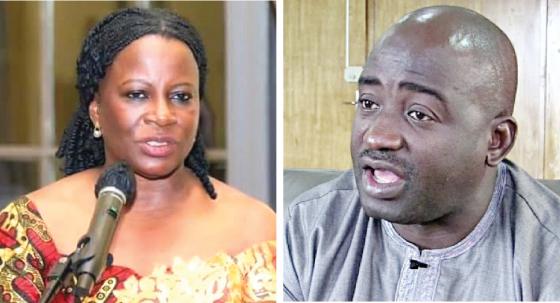Political Infighting Could Hamper the Creation of a Level Playing Field for Elections

Chairman Bility (right), on Dec. 6 informed his political leader, Senator Nyonblee Karnga-Lawrence (left) that she has been suspended for owing dues of US$18,000 for the period January — December 2021.
Make no mistake about it, the deepening of the crisis in the Liberty Party, if left unresolved, could serve to make the national political landscape even more fractious with implications for national stability and the creation of a level playing field for elections.
The ongoing feud between party chairman Musa Bility and political leader, Senator Nyonblee Karnga-Lawrence, could serve to split the party with one faction loyal to Senator Nyonblee Karnga, political leader of the party and the other loyal to its Chairman Musa Bility.
A virtual war of words has since ensued in the wake of suspension imposed by chairman Musa Bility on Senator Darius Dillon, party vice chair for political affairs and Daniel Sando, vice chair press and public affairs. Both men have since rejected the suspension while political leader Nyonblee Karnga-Lawrence has gone a step further, annulling the suspensions.
Supporters of political leader Nyonblee Karnga-Lawrence, amongst them Senator Darius Dillon, have accused chairman Musa Bility of attempts to have the Liberty Party throw its support to ANC leader Alexander Cummings in his quest to become the head of the presidential ticket to be fielded in the 2023 elections.
For its part, the Collaborating Political Parties (CPP) has also been involved in internecine feuding and bickering over the question of who heads the 2023 ticket. And the issue has been centered on two individuals. They are former Vice President Joseph N. Boakai of the Unity Party (UP) and Alexander B. Cummings of the Alternative National Congress (ANC).
Such feuding within the ranks of the opposition are, according to a political analyst, giving rise to fears that what the public had once hoped was the only alternative to face up to incumbent President George Weah at the polls in 2023 now appears to be shaky.
Perhaps this can explain why President Weah has declared that he will win massively in 2023 and that the response of the opposition to his massive victory will be to cry foul.
And it appears he is confident in the belief that crying foul will not help the cause of the opposition. Analysts say that the current leadership, smarting from the massive defeat it suffered at the hands of Darius Dillon during the Senatorial elections, is prepared to go all out to ensure that such never happens again even if it means conducting fraudulent elections.
Judging from the experience of the 2017 elections, such emphatic declarations by an incumbent of a massive win at the 2023 polls should be considered a wake-up call to the political opposition. According to analysts, the composition of the National Elections Commission is an issue which the public believes is compromised and appears more likely than not to be a major bone of contention down the road.
Another key issue of concern is the integrity of the Voters’ Registry (VR). During the 2017 electoral period, the VR was declared compromised by the Supreme Court which ordered a clean-up but which was never done.
With such limited time left to 2023, if this matter is not addressed in time, political parties will have themselves to blame for the unintended consequences. Because voter trucking continues to remain an issue of concern laden with conflict potential, demarcation of constituencies following the holding of the national census will prove crucial. But whether the Legislature will pass the threshold bill to enable the process remains uncertain at this point.
Perhaps if the political opposition could sort out their problems, they could speak with one voice on these all-important issues. These are matters that need to be addressed in a timely fashion. But if opposition parties spend their time tussling like crabs in a bucket, it is unlikely they will achieve anything of substance.
And that will be to the disappointment of the public. But truth be told, the institutionalization of politics in Liberia is still a long way off. Unlike the University of Liberia, where students vote on party lines, in the larger society, most people vote on individual lines rather than along party lines.
But opposition political parties may be fooling themselves to believe that, at the end of the day, the people of Liberia will line up behind a candidate from whatever is left of the CPP. Time and again, Liberians have demonstrated that uncanny sense of judgement of what is in their best interest. After all the jostling and feuding amongst the warring factions, for example, the Liberian people, weary of the prolonged and senseless fighting, they opted for Taylor hoping for a peace that eventually proved elusive.
The Liberian people have made it clear, judging from the recent elections and referendum, that they are resolved to express their desire for change at the ballot box and that they are not prepared to settle for fixed elections results.
President Weah has the obligation as President to ensure a level playing field for the conduct of the elections. To do otherwise will simply be an invitation for trouble. And he should remember that he does not have the luxury of time.
The political opposition must also rise up to the challenge to ensure the creation of a level playing field for elections as principal stakeholders. They also do not have the luxury of time.
